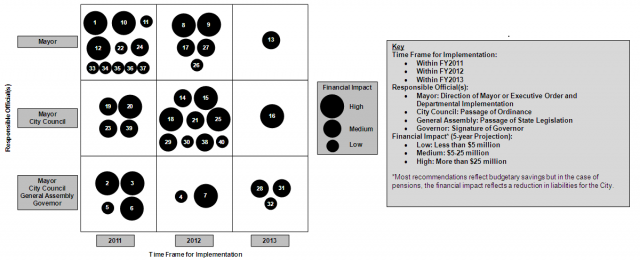Recommendations for a Financially Sustainable City of Chicago
The purpose of this report is to provide the City of Chicago’s Mayor and City Council with detailed recommendations on ways to address the City’s serious financial challenges.
Click here to read the complete report
Click here to read the press release
This report provides recommendations for creating a government that is more efficient, less costly and more accountable. It contains some recommendations that can be implemented immediately in the current fiscal year and others in FY2012 or FY2013. Cooperation between City Council and the Mayor is key to implementing all of the major recommendations contained in this report. It is also their responsibility to oversee an efficient City and address critical budgetary issues. In some cases, major efforts for reform require further cooperation from the Illinois General Assembly and Governor in order to pass needed legislation.
Mayor Rahm Emanuel and City Council members will need to make difficult choices to close the immediate budget gap of at least $600 million and set the City on a path to long-term fiscal stability. Although the recommendations in this report in many instances go beyond the FY2012 budget gap, the Civic Federation urges the City to address both its immediate FY2012 deficit and its structural deficit with a long-term planning strategy that will cut costs, reduce the City’s long-term liabilities, improve the processes with which City services are administered and make investments for future cost savings.
The index and matrix of the Civic Federation’s recommendations below provide a summary of the report and illustrate each recommendation’s financial impact and relative ease of implementation. The index lists each of the Civic Federation’s recommendations in the order that they appear in the report. Some of the key recommendations include:
- Addressing escalating personnel costs through actions such as layoffs, benefit reductions and changes in staffing structure, which would yield a high financial impact and could be initiated by the Mayor;
- Implementing pension reform including reducing benefits not yet earned by current employees and increasing both employer and employee contributions, which would yield a high financial impact but would require state legislation;
- Addressing the inefficiencies embedded in the City’s infrastructure management system, including issues related to collective bargaining and organizational structure, which would yield a high financial impact but would require the cooperation of the Mayor and City Council; and
- Implementing a number of budget format and process initiatives to make the City’s government more transparent and financially stable, which could be initiated by the Mayor and would have a low financial impact.
The Civic Federation urges Mayor Emanuel and the City Council to put Chicago on the path to long-term fiscal sustainability by implementing the recommendations included in this report. We will revisit the status of the recommendations annually in our testimony before the City Council and our yearly review of the City’s budget and other Civic Federation publications.

The Civic Federation has prepared several tutorials to help explain the report:
A Brief Introduction to the City of Chicago
Frequently Asked Questions about the Report
Civic Federation research about the City of Chicago:
- Financial Challenges for the New Mayor of Chicago: Analysis and Recommendations
- Analyses of City of Chicago budgets
- All Civic Federation research pertaining to the City of Chicago
